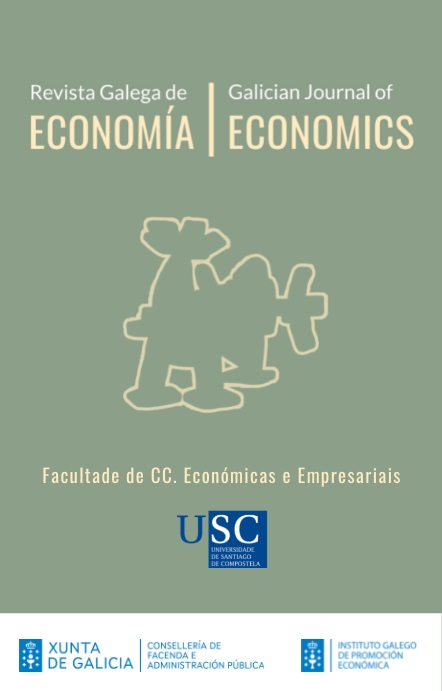EVOLUCIÓN NA XERACIÓN DE RESIDUOS AO LONGO DAS CADEAS DE SUBMINISTROS NAS ECONOMÍAS IBÉRICAS: ANÁLISE COMPARATIVA DE ESPAÑA E PORTUGAL
Contido principal do artigo
Resumo
Nas últimas décadas a xeración de residuos converteuse nun dos principais
problemas medioambientais debido ao impacto que exerce unha incorrecta xestión dos
mesmos sobre o medio natural. Perante este contexto, foise propagando unha maior
preocupación ambiental na que a redución do volume de residuos é a súa principal premisa.
No caso da Unión Europea (UE), o obxectivo da lexislación en materia de xestión de residuos
centrouse na prevención e na reciclaxe para tender cara un crecemento económico moito
máis sostible. Porén, e malia os logros acadados, é necesario seguir avanzando nesta liña xa
que moitos membros, especialmente, os do Sur de Europa, aínda se afastan dos obxectivos
propostos para 2020. Por iso, o obxectivo deste traballo é aplicar unha metodoloxía Análise
de Ciclo de vida Input-Output (EIO-LCA nas súas siglas en inglés) para analizar o volume e
tipoloxía de residuos xerados directa e indirectamente en cada elo da cadea de subministros
das actividades económicas de España e Portugal.
In recent decades waste generation has become one of the main environmental
problems due to the impact that an incorrect management exerts on nature. Consequently, a
greater environmental awareness has been spreading so that waste reduction has become its
main premise. In the case of the European Union (EU), the aim of the waste legislation is
based on prevention and recycling towards a more sustainable economic growth. However,
despite the achievements, it is necessary to continue advancing in this line since many
Members, especially those from Southern Europe, are still far away from the 2020 objectives.
Therefore, the aim of this paper is to apply an Economic Input-Output Life Cycle Analysis
(EIO-LCA) to analyze the volume and type of waste generated directly and indirectly in each
link of the supply chain of the economic activities in Spain and Portugal.
Palabras chave
Detalles do artigo
Citas
CARRASCAL, A.; FERNÁNDEZ, M.; PEREIRA, X. (2013): “Generación de residuos derivados del turismo receptor en Galicia”, Revista Galega de Economía, 22(1), pp. 31-50.
DOLDÁN, X.R.; CHAS, M.L. (2002): “Análisis de la integración de las cuentas económicas y ambientales del monte”. Revista Galega de Economía, 11 (2), pp. 1-18.
EUROSTAT (2018): Datos de generación de residuos. Recuperado de: http://ec.europa.eu/eurostat/data/database
HENDRICKSON, C.; HORVATH, A.; JOSHI, S.; LAVE, L. (1998): “Economic input-output models for environmental life cycle assessment”, Policy Analysis, 32(7), pp. 73-86.
HENDRICKSON, C.; LAVE, L.; MATTHEWS, H. (2006): Environmental life cycle assessment of goods and services: an input-output approach. Washington: Resources for the future
HOOGMARTENS, R.; VAN PASSEL, S.; VAN ACKER, K.; DUBOIS, M. (2014): “Bridging the gap between LCA, LCC and CBA as sustainability assessment tools, Environmental Impact Assessment Review, 48, pp. 27-33
MILIOS, L. (2018): “Advancing to a Circular Economy: three essential ingredients for a comprehensive policy mix”, Sustainability Science, 13(3), pp. 861-878
MILLER, R.E.; BLAIR P. (2009): Input-Output analysis: foundations and extensions. New York: Cambridge University Press
NAKAMURA, S.; KONDO, Y. (2009): Waste input-output model: concepts and application to industrial ecology. Netherlands: Springer Science & Springer Media
PIRES, A.; MARTINHO, G.; CHANG, N.B. (2011): “Solid waste management in European countries: A review of systems analysis tecniques”, Journal of Environmental Management, 92(4), pp. 1033-1050
RODRÍGUEZ, M.; RUIZ, S.M.; CAMACHO, J.A. (2016): “An estimation of the evolution of waste generated by direct and indirect suppliers of the Spanish paper industry”, Waste Biomass Valorization, 7(3), pp. 635644
RUIZ, S.M. (2016): La sostenibilidad en un sistema productivo globalizado: el papel y el cartón, ¿residuo o materia prima? Granada: Universidad de Granada
RUIZ, S.M.; RODRÍGUEZ, M.; CAMACHO, J.A. (2014): “Direct and indirect generation of waste in the Spanish paper industry”, Waste Management, 34(1), pp. 3-11
TIMMER, M.P.; DIETZENBACHER, E.; LOS, B.; STEHRER, R.; DE VRIES, G.J. (2015): “An illustrated user guide to the World Input-Output Database: the case of global automotive production”, Review of International Economics, 23, pp. 575-605
WIOD (2016): Waste Input-Output Database. Recuperado de: http://www.wiod.org/database/wiots16







